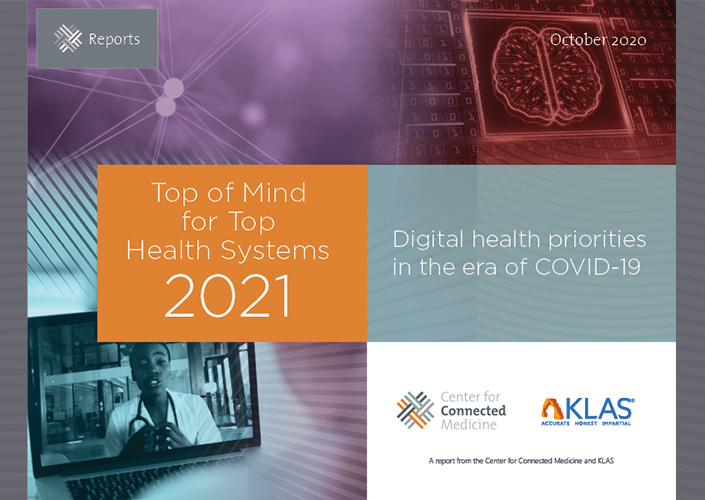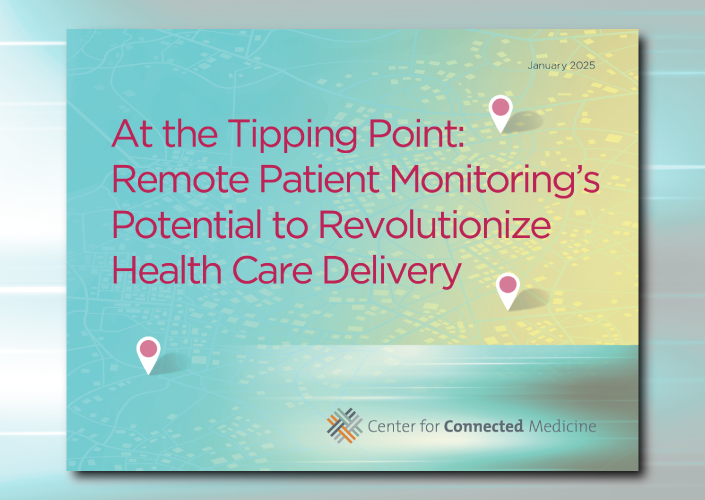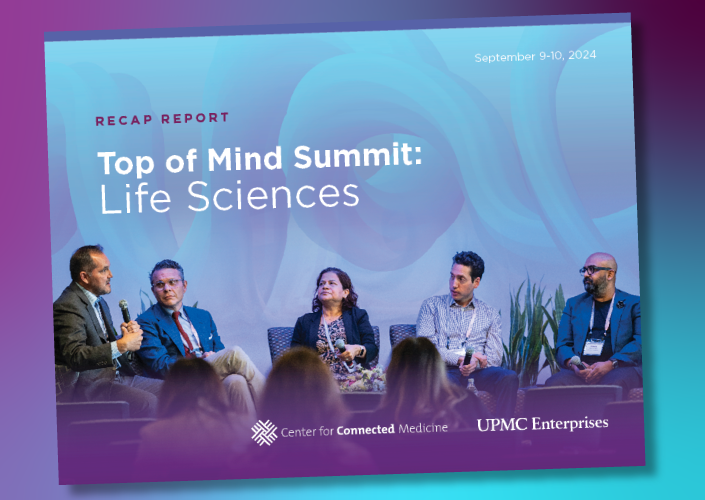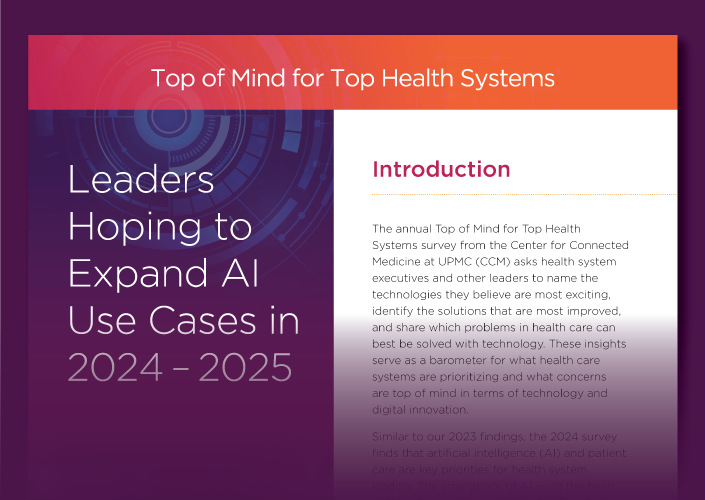Download new research from CCM and KLAS on telehealth, AI, revenue cycle management – technologies integral to providers’ future
When the COVID-19 pandemic hit early in 2020, it presented health systems across the U.S. with a need to accelerate innovation during an unprecedented time that shut down many in-person medical services.
Health systems quickly turned their attention to rapidly scaling telehealth, deploying artificial intelligence (AI), and improving revenue cycle management, according to new research from the Center for Connected Medicine (CCM). Click the button above to download the full report.
The CCM’s fourth annual “Top of Mind for Top Health Systems” report, conducted in partnership with KLAS Research, surveyed 117 executives representing 112 health care provider organizations. It focuses on how innovation priorities shifted in response to COVID-19 and the role of key technologies in managing the pandemic.
Survey results indicate three technologies — telehealth, AI, and revenue cycle management — were priorities for the future at many health systems before the pandemic, but COVID-19 caused organizations to fast-track implementation. Health systems looked to telehealth to continue seeing patients, AI to enable better decision making, and revenue cycle management technologies to improve efficiencies.
More key findings from the Top of Mind research
Highlights from the Top of Mind research findings include:
- Nine out of 10 organizations successfully met increased telehealth demand during the pandemic. However, quick implementation of solutions magnified opportunities for improvement, including integration and patient and clinician experience — which many will seek to address in the coming year.
- Three-quarters of respondents said their organizations are measuring and analyzing data from telehealth. However, a limited number are examining health outcomes related to telehealth, which will be important to establishing value from the technology.
- Half of respondents reported using AI in response to the pandemic for applications such as clinical decision support, management of beds, staffing and devices, and analytics – experience that is boosting interest in the technology and pointing to greater utilization in the year ahead.
- A majority of respondents said their organizations are using 20% or less of their health care data to inform AI applications, suggesting health systems need to do more to standardize and share their data.
- Identified as an area most in need of innovation, revenue cycle management has become a greater priority for health systems, with 57% of respondents saying they are optimistic or very optimistic that innovation can happen in the coming year.
- Predictive analytics, AI, bots, and automation are cited as the most-needed technologies to improve revenue cycle management (cited by 26% of respondents) as health systems look for opportunities to be more efficient.
“2020 has been quite the curveball for health care,” said Adam Gale, president of KLAS.
What the experts say
“Technology has been so essential to the COVID-19 response at UPMC and other health systems that the line is now blurred between traditional health care and digital health. Technology and digital applications that were once not used to their full potential are now a permanent part of providing the best possible care for our patients,” said Rob Bart, MD, chief medical information officer at health system UPMC. “It is now our responsibility to create an excellent patient experience with all of the tools at our disposal, whether they are virtual or in person.”
“2020 has been quite the curveball for health care,” said Adam Gale, president of KLAS. “Thankfully the foundations for digital care had already been laid, allowing organizations to rapidly shift focus and continue to provide excellent care in our new, remote world. While we look forward to an eventual return to normalcy, I hope many of the digital advancements of this year aren’t forgotten.”
Learn more about the Top of Mind program
The survey was developed with guidance and insight from the Top of Mind Advisory Committee. This group of health care innovation leaders also provided qualitative insights on the findings; while they were not surveyed as part of this research, you can find their thoughts in the report.
- Rob Bart, MD, Chief Medical Information Officer, UPMC
- Cindy Bergevin, Head of Global Enterprise Marketing for Healthcare, Nokia
- Brent Burns, Executive Vice President, UPMC Enterprises
- Pamela Peele, PhD, Chief Analytics Officer, UPMC Health Plan and UPMC Enterprises
- Christopher Pickard, Business Development Leader, Nokia
- Emily C. Webber, MD, Associate Chief Medical Information Officer, Indiana University Health
- Mark Zhang, DO, Medical Director, Digital Innovation Hub, Brigham and Women’s Hospital
In 2020, the CCM has taken its Top of Mind program virtual, offering health care executives the opportunity to hear from experts and engage in dialogue around the three research focus areas telehealth, artificial intelligence and revenue cycle management and the future of digital health. Learn how to get involved with through our webinar, virtual roundtables, and a complimentary virtual summit here.



